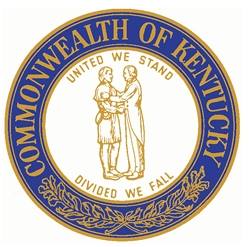 The Energy and Environment Cabinet today announced two contests to protect the environment and to celebrate Earth Day.
The Energy and Environment Cabinet today announced two contests to protect the environment and to celebrate Earth Day.
For middle school students, the “Capture the Earth” photo contest seeks original photographs and for high school students, the “Capture the Earth” video contest seeks original videos. Both contests seek to celebrate the beauty and diversity of Kentucky.
Submissions should attempt to move viewers to care about the environment in Kentucky. The deadline for submissions for both contests is April 7, 2017 at 4:30 p.m.
You can enter the photo contest by sending your photo as an attachment to kidsphotocontest@ky.gov. Your photograph must be saved as a jpeg file. File sizes may not exceed 5MB. The subject line of your email should read STUDENT EARTH DAY PHOTO CONTEST.
You can enter the video contest by uploading your video to YouTube, making it public and emailing the link to: Lanny.Brannock@ky.gov. Your video must be saved as a YouTube link.
The subject line of your email should read STUDENT EARTH DAY VIDEO CONTEST.
For more details about the contest, please visit the Facebook page.
Additional information is available at http://eec.kentucky.gov
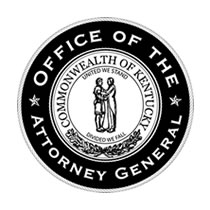 Attorney General Andy Beshear today joined with other state attorneys general to send a letter to federal officials expressing continued support of recent federal protections for students in higher education and taxpayers.
Attorney General Andy Beshear today joined with other state attorneys general to send a letter to federal officials expressing continued support of recent federal protections for students in higher education and taxpayers.
Beshear sent the letter to U.S. Department of Education Secretary Elisabeth DeVos and congressional leadership detailing how rolling back federal education laws would allow some of the “worst actors in the for-profit school industry” to harm Kentuckians.
“College has never been more unaffordable, and students are being crushed with debt,” Beshear said. “My office is focused on ensuring Kentucky students are treated fairly but if these protections are rolled back by the federal government, those days are over.”
According to the letter, millions of students have been defrauded by unscrupulous for-profit, postsecondary schools over the past 15 years.
The list of investigations and enforcement actions against for-profit colleges by state AGs include: American Career Institute; Ashford University/Bridgepoint Education Inc.; Corinthian Colleges Inc.; Career Education Corporation; Education Management Corporation; Daymar College; DeVry University; ITT Tech; National College of Kentucky and Westwood Colleges.
In December, Beshear announced nearly 3,500 former students of Daymar College’s Kentucky campuses and online programs will receive restitution checks totaling $1.2 million. The payments are pursuant to a settlement agreement the Office of the Attorney General entered into with Daymar in 2015 resolving a consumer protection lawsuit.
In August, Beshear announced that the Kentucky Court of Appeals had affirmed a previous order by Franklin Circuit Court requiring National College of Kentucky Inc. and its attorneys to pay the state a combined $157,000 in civil monetary sanctions. Earlier this month, the Kentucky Supreme Court declined to take up National College’s request to overturn the appeals’ court decision.
In March, Beshear joined seven other state attorneys general in asking the U.S. Department of Veterans Affairs to restore educational and vocational benefits to thousands of veterans victimized by Corinthian Colleges Inc. for predatory practices.
Beshear said he and the other attorneys general need federal officials to keep a number of protections, including the Gainful Employment Rule, which ensures students who attend career-training programs are able to repay their federal student loans once they graduate.
The AGs are pushing to keep vigorous federal oversight of school accreditors who are tasked with providing prospective quality assurance of schools, and the Borrower Defense to Repayment Rule, which will provide a fair and transparent process for students who have been defrauded to apply for federal student loan relief.
Map celebrates the Commonwealth’s 225th birthday, showcases ‘Kentucky’s Great Lakes’
Featuring the Commonwealth’s expansive waterways, Kentucky’s new road maps will create quite a splash in the upcoming travel season.
The 2017 Official Highway Map – now available at rest areas, welcome centers, local convention and tourism offices and all Kentucky state parks– provides more than directions for its readers.
This year’s map highlights the wealth of recreation and relaxation opportunities presented by “Kentucky’s Great Lakes.” Known internationally for its scenic lakeside shorelines, Kentucky’s vast lake system offers over 360,000 acres for individuals to play and unwind.
The 2017 highway map also celebrates the quasquibicentennial, or the 225th anniversary, of the Commonwealth’s statehood. Founded in 1792, Kentucky boasts a rich history with an exciting, prosperous future.
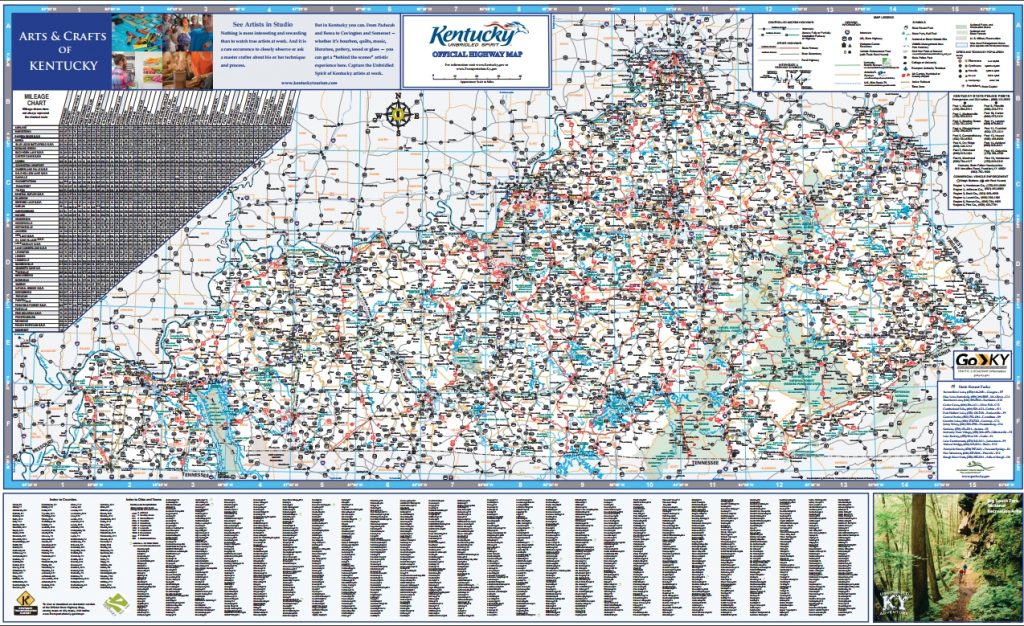
In his invitation to visit and explore all that Kentucky has to offer, Governor Matt Bevin spoke of the 225 years of memories captured in the Commonwealth.
“Kentucky travelers have long enjoyed the endless opportunities awaiting them along the Commonwealth’s highways and byways,” said Gov. Bevin. “As we celebrate our 225th anniversary this year, we invite residents and visitors alike, to join the fun in exploring all the Bluegrass State has to offer. We extend a warm Kentucky welcome to all who seek arts, history, culture, discovery and adventure—from our western waterlands to our eastern mountains, and all points in between. Thank you for exploring the most beautiful state in America!”
Published annually, the highway map highlights popular travel destinations:
- Berea: Channel the inner artist at the Kentucky Artisan Center.
- Bowling Green: Experience the thrill of the corvette at the National Corvette Museum.
- Danville: Enjoy live stage action at the Pioneer Playhouse, Kentucky’s oldest outdoor dinner theatre.
- Hodgenville: Visit the birthplace of President Abraham Lincoln.
- Louisville: Hear the rumble of charging horses at the home of the Kentucky Derby.
- Paducah: Admire the wall-to-wall murals down by the riverside.
- Slade: Scale the soaring wonders of Natural Bridge State Park.
For individuals with an artistic flair, the map features stopovers like Covington and Somerset where budding artists can get a “behind the scenes” look as artisans demonstrate their craft and bring their ideas to life. For adventurists with a bent toward hiking, bicycling or horseback riding, the map details numerous Kentucky trail towns and pathways ready to be explored. Continue reading
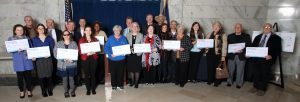
Photo: KHS
Last week, the Kentucky Historical Society (KHS) announced recipients of the first grants from the Kentucky Local History Trust Fund (KRS 171.325), a funding pool that supports local history organizations’ efforts to preserve and tell Kentucky’s stories.
Seventeen organizations from 16 counties across the Commonwealth received grants totaling $9,504.30. Individual amounts range from $290 to $1,000 for projects related to collection conservation, education, promotion, exhibits and strategic planning.
Kentucky Local History Trust Fund grant recipients include:
- Appalshop, Inc., $1,000, Letcher County, for collection management
- Highlands Museum and Discovery Center, $1,000, Boyd County, for collection management
- The Friends of Audubon, $1,000, Henderson County, for exhibit artifact conservation
- Ben E. Clement Mineral Museum, $909, Crittenden County, for educational programming
- McDowell House Museum, Inc., $700, Boyle County, for collections management
- American Printing House for the Blind, $700, Jefferson County, for exhibit installation
- Bluegrass Heritage Museum, $600, Clark County, for collection management
- Boone County Public Library, $500, Boone County, for collection management
- Shelby County Historical Society, $500, for organization development/management
- Montgomery County Historical Society, $500, Montgomery County, for exhibit artifact conservation
- Erlanger Historical Society, $355.30, Kenton County, for collections management
Six groups received $290 each to enroll in the American Association for State and Local History Standards and Excellence Program for History Organizations field-based standards program. Participation in a standards-based program such as this one is one of the requirements for grant eligibility.
- Duncan Tavern Historic Center, Bourbon County
- Historic Paris-Bourbon County/Hopewell Museum, Bourbon County
- Hickman County Historical and Genealogical Society, Hickman County
- Riverview at Hobson Grove, Warren County
- Allen County Historical Society, Allen County
- Kentucky Railway Museum, Inc., Nelson County
Local History Trust Fund money comes from Kentuckians who donate a portion of their state income tax refund (as little as $1 or as much as the entire refund). The Kentucky Historical Society administers the Local History Trust Fund, accepting applications and awarding grants. For this work, it may reserve 15 percent of the annual contributions to cover administration costs.
Emergency Alert System Activation Will Appear as an Actual Tornado Event
 The National Weather Service (NWS-KY) and the Kentucky Emergency Alert System (EAS, which includes all Kentucky broadcast radio and TV stations) will conduct a tornado drill in support of the Governor’s order naming February “Severe Storm Preparedness Month.”
The National Weather Service (NWS-KY) and the Kentucky Emergency Alert System (EAS, which includes all Kentucky broadcast radio and TV stations) will conduct a tornado drill in support of the Governor’s order naming February “Severe Storm Preparedness Month.”
This statewide tornado drill will include an activation of the EAS – the loud, screeching tones that we hear on television and radio during times of severe weather. The test will make use of the the ‘live’ Emergency Alert System code “TOR” and is scheduled for Friday, March 3 at 10:07 AM EST. If there is a threat of actual severe weather on the scheduled test day, the test drill will be postponed to March 1st or the first day with non-threatening weather conditions.
The Kentucky State Emergency Communications Committee (SECC) has obtained, from the FCC, a one-time waiver of federal rules to allow broadcasters to legally relay this drill, which can normally only be aired during actual tornado events.
One of the stipulations of the waiver grant is that all broadcasters will make every practicable effort to inform the public that the drill is coming and it will be a test, not an actual emergency. Additionally, since this drill must be originated by regional NWS offices, the message may run twice in some areas.
In support of Kentucky agriculture, Attorney General Andy Beshear joined with other egg-producing states to ask the country’s highest court to review a lower court’s decision that upheld California’s “Shell Egg Laws.”
In 2015, the six states asked the Ninth Circuit of the United States Court of Appeals to block enforcement of the California laws and regulations prescribing standards for the conditions under which chickens must be kept in order for producers to sell eggs in the state. California is the country’s largest egg market.
The appeals court ruled against the six states in favor of a lower court ruling. The group of states are now asking the United States Supreme Court to take up the issue. The states are Alabama, Iowa, Kentucky, Missouri, Nebraska and Oklahoma.
“Kentucky is a thriving egg-producing state, and this law places our agriculture industry and farming families at a disadvantage by increasing farming cost and driving up the cost of food for Kentuckians,” Beshear said. “The Supreme Court must review this issue in order to level the playing field for our producers against out-of-state regulations.”
 The group of five attorneys general and the Governor of Iowa representing egg-producing states argue that the laws hurt agriculture in their states and are in violation of the Commerce Clause, which regulates trade among states and foreign nations.
The group of five attorneys general and the Governor of Iowa representing egg-producing states argue that the laws hurt agriculture in their states and are in violation of the Commerce Clause, which regulates trade among states and foreign nations.
The group asserts that its egg farmers must choose to either bring their entire operations into compliance or not sell in the California marketplace. The states argue that the necessary capital improvements to meet the standards would cost farmers hundreds of millions of dollars.
Kentucky farmers produced 1.3 billion eggs in 2015, according to the USDA.
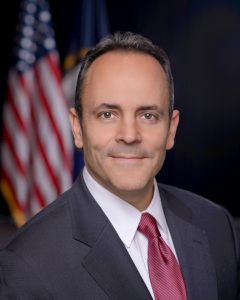 Gov. Matt Bevin testified last week before the House Judiciary Committee in support of House Bill 333, which seeks to set common sense limits on pain medication prescriptions in an effort to combat Kentucky’s opioid epidemic. The bill also has several measures to regulate, prohibit and punish the illicit possession, importation and trafficking of fentanyl, carfentanil and fentanyl derivatives.
Gov. Matt Bevin testified last week before the House Judiciary Committee in support of House Bill 333, which seeks to set common sense limits on pain medication prescriptions in an effort to combat Kentucky’s opioid epidemic. The bill also has several measures to regulate, prohibit and punish the illicit possession, importation and trafficking of fentanyl, carfentanil and fentanyl derivatives.
Introduced by Rep. Kimberly Moser and a group of five bipartisan co-sponsors, this legislation seeks to prevent the creation of new addicts by reducing overexposure and oversupply of opioids in acute care settings. Recent statistics show that Kentucky ranks third among all states in opioid addiction, with a rate double the national average.
“Until we have a frank conversation—as it relates to everything from the production, prescription, dissemination, and prosecution of opioids—we’re not going to fix the problem,” said Gov. Bevin. “With the exception of intentional drug dealers, most of the people who are complicit in this didn’t start out trying to be complicit in something that has been so crippling to our nation and to the Commonwealth.”
In accordance with Center for Disease Control and Prevention (CDC) guidelines, House Bill 333 would prohibit a practitioner from issuing a prescription for more than a three-day supply of a Schedule II controlled substance intended to treat pain as an acute medical condition.
Certain exemptions would apply for cancer patients, individuals diagnosed with chronic pain, those in narcotic treatment programs, patients receiving end-of-life care, and other situations deemed medically necessary.
Studies compiled by the National Institute on Drug Abuse illustrate the importance of decreasing exposure to opioids: 86 percent of injection drug users took opioid pain relievers non-medically prior to using heroin, 75 percent of individuals abusing opioids used a prescription drug as their first opioid, and incidence of heroin initiation is 19 times higher among those using non-medical pain relievers versus those who did not.
“This addiction is everywhere, and we have to make it harder to get addicted,” said Gov. Bevin. “We don’t have the luxury of being able to pretend this doesn’t exist.”
 Weather
Weather Traffic
Traffic @LouisvilleDispatch
@LouisvilleDispatch @LouisvilleDisp
@LouisvilleDisp Subscribe
Subscribe